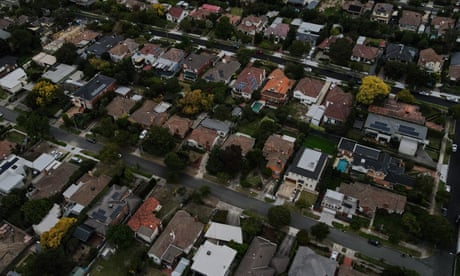- by foxnews
- 08 Apr 2025
Distressed housing sales rise as owners succumb to Australia’s rising interest rates
Distressed housing sales rise as owners succumb to Australia’s rising interest rates
- by theguardian
- 05 Nov 2022
- in news

Distressed housing listings are on the rise as mortgage holders struggle under the weight of seven consecutive interest rate hikes.
The number of homeowners selling properties under distressed conditions has risen by about 15% since interest rates began to increase in May, SQM Research found, at the same time the housing market is slowing.
In the past month alone, distressed listings, where the seller is forced into making a loss or accepting a lower price than they usually would, jumped by 5.7% nationally, with increases of 7.8% in New South Wales and 7.5% in Queensland.
The chair of the Property Investors Council of Australia (Pica), Nicola McDougall, said many homebuyers and investors overpaid for properties in boom market conditions last year - believing interest rates would stay low until 2024 - and were now feeling the pinch of spiking mortgages.
"It's not surprising that we're starting to see an increase in distressed sales because of the sharp increase in interest rates this year," she said.
"Mortgage repayments have increased so significantly in such a short space of time, which is starting to cause financial harm to many people, and especially those homebuyers who perhaps borrowed too much."
The 2022 Pica investor sentiment survey found nearly 17% of investors had sold a property in the two years to August, with a further 19% indicating they had intentions to sell in the year ahead.
"The survey was conducted in August when the cash rate had been increased four times - it has now risen seven times in as many months," McDougall said.
"Even in August about 13% of investors said they were thinking of selling because rising interest rates were making it harder, or impossible, to afford."
On Tuesday the Reserve Bank raised interest rates by another 25 basis points, taking the official cash rate to 2.85%.
The latest interest rate rise will add more than $114 to monthly repayments for a typical $750,000 mortgage.
The president of the Real Estate Institute of Australia, Hayden Groves, said it was anticipated mortgage stress would begin to escalate into 2023, particularly as there had been "basically zero" distressed sales during Covid.
"Banks were holding off any action on loan holders," he said. "Some of that is now slowly starting to lift, and the major challenge is the rapid rise in interest rates.
"People who might have been on fixed term loans at 2% will suddenly find themselves with a threefold rise. And in markets like Sydney, where housing affordability is most constrained, up to 46% of people's incomes are going to mortgages."
Groves said it was likely first home buyers who bought during a Covid stimulus period and investors struggling to hold two mortgages were the hardest hit, particularly in rental markets like Sydney and Melbourne with low net returns.
"There's not a lot of wriggle room if interest rate rises continue," he said. "It's a shock to the system."
The research director of RateCity.com.au, Sally Tindall, said each month the cash rate was increased, the amount banks were willing to lend borrowers shrank, making it particularly difficult for first home buyers to enter the market.
"This has the property market rattled, with both buyers and sellers exiting in droves," she said. "The hordes of cashed-up buyers are gone."
The value of new approved home loans dropped 8.2% in a month, ABS data released on Wednesday found, falling to the lowest rate since November 2020.
The research director at CoreLogic, Tim Lawless, said it was unlikely the worst of the decline was over as borrowers faced the "double whammy" of further interest rate hikes and rising inflation.
"There is a genuine risk we could see the rate of decline re-accelerate as interest rates rise further and household balance sheets become more thinly stretched," Lawless said.
CoreLogic's latest home value index, released on Tuesday, found every capital city and regional area excluding South Australia recorded a drop in housing values last month - the sixth consecutive month of declines.
Brisbane experienced the sharpest fall of 2%, followed by regional NSW at 1.7% and regional Victoria at 1.4%. National values fell by 1.2%.
Despite the dip, house values remain well above pre-Covid levels. Nationally, values have dropped by 6.5% compared with a 25.5% rise through the upswing.
In Sydney, values are down 10.2%, however it's compared with a 27.7% rise in January. Melbourne values are down 6.4% since February, after rising 17.3%.
Affluent inner-city suburbs have been among the worst hit. Sydney buyers agent Paul Mulligan said he'd received reports of declines in returns of up to 25% in both Surry Hills and the Northern Beaches.
"I am hearing from sellers and agents that they are selling off investment properties in some areas where the return is useless," he said.
"Most sellers are lots of mum and dad investors that make up the proportion of the average. People that have holiday rentals in coastal areas are also selling up."
At a time when the spring selling season traditionally peaks, national listings are instead in decline, sitting 25.2% lower than last year and almost 19% below the previous five-year average, according to CoreLogic.
At the same time, just 59.8% of auctions held across capital cities in the week ending 30 October were successful, compared with 76.8% this time last year.
- by foxnews
- descember 09, 2016
Ancient settlement reveals remains of 1,800-year-old dog, baffling experts: 'Preserved quite well'
Archaeologists have recently unearthed the remarkably well-preserved remains of a dog from ancient Rome, shedding light on the widespread practice of ritual sacrifice in antiquity.
read more


